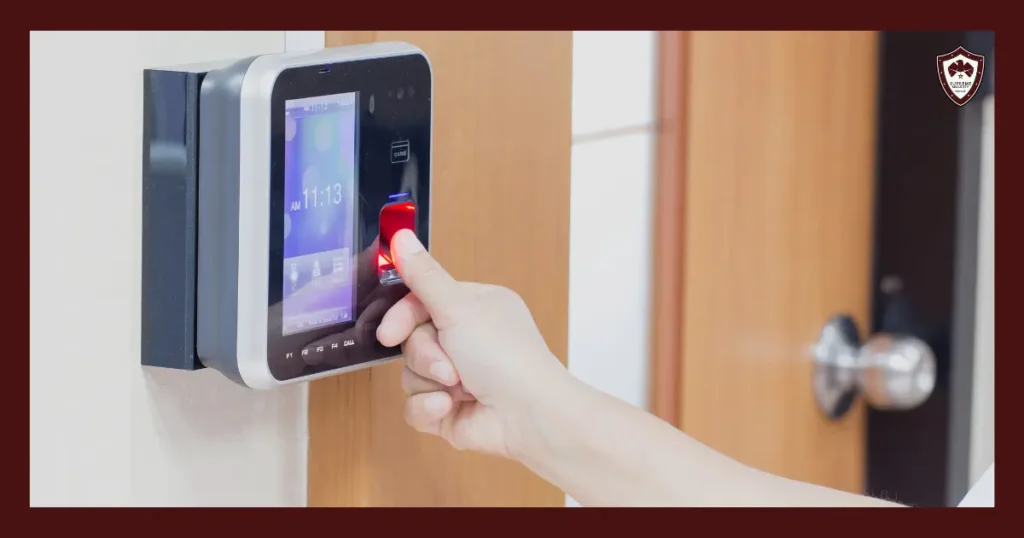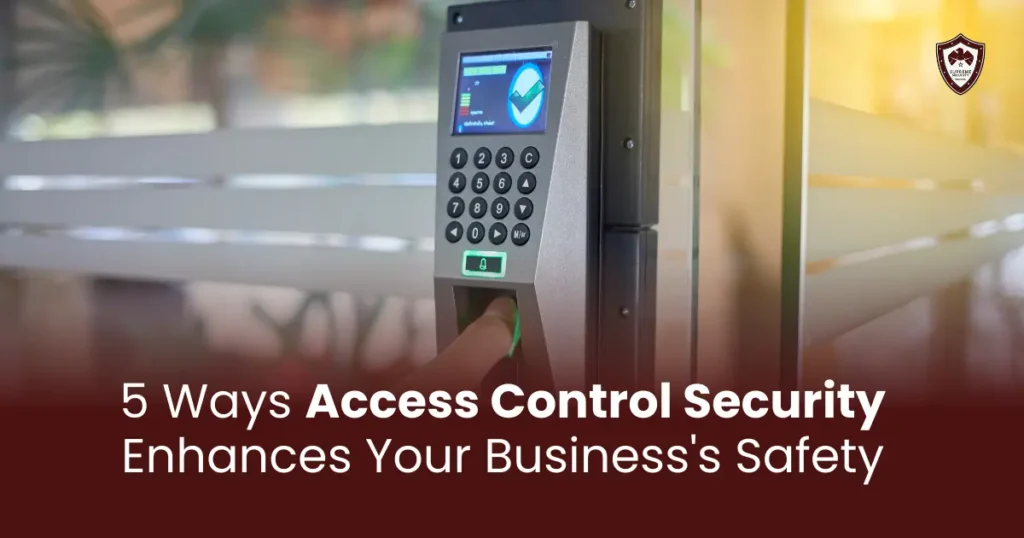In today’s fast business world, security is really important. Keeping your business safe is not merely about locking doors at night but protecting your property, keeping private information secure, and ensuring your employees are safe.
Access control systems have been engineered to regulate access into your business premises as well as the time they get access. They ensure that only authorized personnel have access to certain sections. Therefore, this prevents some security-related thefts as well as unauthorized access of data, among others. Whether a small start-up or big corporation, investing in an access control system for your business will be an imperative move for strengthening your commercial space.
Access control security helps the business keep confidential files safe and manages who can get into the high-security areas. Smart business security solutions also give you peace of mind as you can watch and control access from anywhere.
Table of Contents
What is Access Control Security?
Access control security refers to that system that controls who is authorized to enter particular parts of a building or facility and under what conditions. It allows only authorized people to have access to offices, storage rooms, and other restricted zones. Access control security is very central to protecting your assets, employees, and other sensitive data.
Types of Access Control Systems
Access control security comes in different forms, all designed for specific organizational needs. Companies can select from among physical access control, electronic access control, or smart access control systems, depending on business needs for levels of security.
1. Physical Access Control Systems
Traditional security measures rely on physical keys, locks, and badges to control access. While simple, these systems are susceptible to loss or theft and can be duplicated, which may compromise the security.
2. Electronic Access Control Systems
These systems use electronic devices, such as keycards, PIN numbers, or swipe cards, that manage access. They offer much higher security than classic physical systems because credentials can be easily updated, revoked, or reissued when necessary. Some notable examples include card readers and keypad-based entry systems.
3. Smart Access Control Systems
Smart systems, the most recent advancement in access control security, use mobile applications and biometric scans, like fingerprint or facial recognition, to grant access. These systems can be easily combined with alarm and video surveillance systems, among other commercial security options. They enable businesses to manage access from afar and in real time, thereby enhancing the efficiency and convenience of security measures.
The Importance of Access Control Security for Every Business
Every business should take access control systems seriously in protecting physical and digital assets. In order to lower the possibility of unwanted access and guarantee that only individuals with a high level of trust are permitted admission into restricted areas, access control systems are crucial. Here’s why every business needs this:
- Safeguarding sensitive information in today’s digital age, including confidential data, intellectual property, and financial records, has become a need.
- Preventing theft and vandalism involves restricting access to valuable assets, which significantly diminishes the likelihood of theft occurring.
- Increase accountability: It helps businesses maintain detailed records of persons who access particular areas; hence, they will observe activities and note peculiar behaviors.
- Enhanced employee safety: Limiting access to dangerous zones or hazardous areas helps keep employees safe.
Customized access control services to the various local security concerns are offered to Ontario businesses through Building Security Services Ontario. Thus, in an effort to ensure security at all levels, these services assist the companies in choosing and implementing appropriate and effective systems.
Benefits of Access Control Systems for Businesses
It provides a wide array of benefits with respect to security and the efficiency of their operations. Such as:
- Protection against unauthorized access is obtained by preventing potential theft, breach of data, or any act of vandalism so that only the authorized might enter the restricted fields.
- Recording Movement: Use electronic systems to monitor all movements of employees and visitors, recording those who enter and leave the company during what time. Increased Accountability and Security: Since these systems require identification, they ensure that individuals are accountable for their movements within the building.
- Real-Life Example: In a local tech firm, commercial access control systems were set up. After this, their security incidents were reduced significantly due to restricted access to certain areas and remote monitoring of employee activities. This in turn helped the organization improve on security as well as enhance their trust level.
With smart security solutions for businesses, these systems provide the added advantage of remote management, real-time monitoring, and integration with other security measures like alarms and cameras, providing a comprehensive solution to business security.

Key Features of Modern Access Control Systems
Modern access control systems for businesses incorporate advanced technologies to enhance security while simplifying management. Some major features include:
- Biometrics: Fingerprint, facial, or iris recognition systems are increasingly common in providing secure, contactless access. These systems allow entry only to the registered person into restricted areas.
- Smart Cards and Key Fobs: Using smart cards or fobs could be a better option given to the employees instead of using usual keys. These cards can very easily be programmed, disabled if needed, or reprogrammed.
- Mobile Access: Many businesses are now using cell phones for access; therefore, employees can unlock doors utilizing their smartphones, giving more accessibility and flexibility.
- Integration with Video Surveillance and Alarm Systems: Most access control systems are integrated with video cameras, alarms, and motion detectors. This integration gives enhanced security since firms can monitor access and immediately respond to suspicious activity.
- Automated Security Management: Smart security solutions for companies allow the automation of various security tasks, such as door locking and unlocking at designated times, sending alerts when unauthorized access is detected, or generating reports on entry/exit logs.
How Access Control Security Improves Business In 5 Ways
Access Control Security offers you a range of benefits that will help improve the safety of your business and secure your operations:
- Prevents Unauthorized Access: By letting in only authorized personnel, you prevent theft or vandalism.
- Tracks movement of employees and visitors: The access logs make it clear who has entered or exited some areas, hence making things more accountable.
- Emergency Preparedness: It enhances emergency preparedness by giving you a locking mechanism to prevent entering unsafe areas in case of emergencies or evacuations.
- Sensitive data: This keeps sensitive data safe since it protects the places where all important information is kept from being accessed by unauthorized people.
- Integration with Other Security Features: Access control can be connected to alarms and video surveillance, and it gives an all-round security system that responds very fast to threats.
Investment in access control will ensure that your business stays safe, efficient, and secure from potential risks. This is because modern businesses need to stay safe.
Access Control Security for Different Business Types
The protection of your company’s assets, personnel, and confidential data depends on your choice of Access Control Security system. Take into account the following elements while selecting a system:
- Small Businesses: Smaller businesses can have simpler, more affordable commercial access control systems, such as keyless entry systems. A small boutique may install a keyless entry system for employees, who can then use an app on their mobile phone to easily manage access for better security without complicated infrastructure.
- Medium to Large Businesses: Large businesses and organizations require powerful solutions and significant scalability. Companies with varied sub-areas of work across multi-level security regions find effective solutions in integrations where biometrics are included and smart cards together with mobile access are required.
Selecting the Appropriate Access Control System
Access Control Security is a primary aspect to consider when ensuring the protection of your assets, employees, and sensitive information. Some things to think about in choosing the right system are as follows:
- Budget: The budget will determine which system the entity intends to use. Small organizations would employ the use of cheap systems like keyless entry and electronic card systems, while large organizations may opt for expensive ones like biometrics and mobile access.
- Business size: the size of your business determines your security needs. A small company with a low number of people may require simple systems, while large corporations would need a robust system with layers for securing different departments or buildings.
- Security needs: assess the amount of security that your business requires. If you handle sensitive data or other valuable assets, you might need a more advanced multi-factor authentication system. Conversely, less sensitive businesses need only basic security.
- Professional Guidance: Commercial Access Control Systems differ according to these factors, and the solutions vary in proportion to your business. For example, smaller businesses may use simple card access systems, while larger businesses may use biometric scanners, mobile access, and video surveillance for a more holistic approach.
Future of Access Control Security
The Access Control Security landscape is rapidly changing with emerging trends that are making systems more efficient and user-friendly.
- AI Integration: By allowing clever features like behavior analysis, predictive analytics, and real-time alerts, artificial intelligence is assisting companies in improving security. AI can also improve biometric accuracy, making identification faster and more secure.
- IoT Integration: Access control systems are being integrated by the Internet of Things (IoT) with other business infrastructure, including environmental controls, video surveillance, and alarms.
- Smart Security Solutions: The trend nowadays, with businesses going for smart security solutions, is the remoting of access management, automatization of security tasks, and integration with other smart devices. The result of the trend gives business owners ease, improved safety, and constant monitoring in real-time, thereby linking them with their security system anywhere in the world.
As the technology evolves, the companies will receive better, more complex, convenient, efficient, and more secure solutions.
Conclusion
The most important strategy to protect your company, staff, and assets will be access control security. Proper technology can protect sensitive data, prevent unwanted access, and improve accountability
Be it a small or large business, investing in the right business security solutions gives peace of mind as well as operational efficiency.
Do not wait for the risks to escalate; instead, take proactive steps today. Access control tailors businesses systems and gets professional advice as to what fits best within requirements. Secure your future today using advanced technology with smart solutions designed to keep your business safe and thriving.
FAQ’s
What makes access control solutions necessary for businesses?
By limiting access to just authorized workers, access control systems safeguard employees, assets, and sensitive data. They also monitor mobility and offer a safe setting for day-to-day activities.
What kinds of company access control solutions are available?
- 1. Fobs, keycards, and locks are examples of physical access control.
2. PIN codes, mobile access systems, or biometric scanners are examples of electronic access control.
3. Smart Systems: Internet of Things-enabled gadgets that are easily managed by integrating with other security systems.

